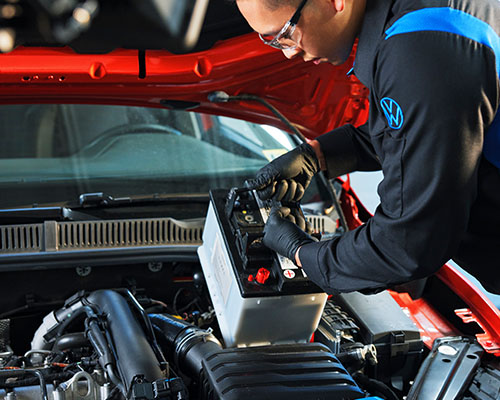Battery testing and replacement services
At Stone Mountain Volkswagen Service Center
At Stone Mountain Volkswagen, we recognize that a dependable battery is vital for your vehicle’s performance and peace of mind. Whether commuting to work or going on a road trip, you can rely on our experts to keep your battery in peak condition. Your vehicle’s battery has a limited lifespan, and a sudden failure can leave you stranded. Our battery testing service ensures that you’re always prepared. Regular testing is crucial, especially if your vehicle is four years old or more or struggles to start.
Our Volkswagen-trained technicians use advanced battery testers to detect weak batteries before they fail. Trust us to keep your battery in top shape so you can drive confidently and safely.

Why Choose Our Battery Maintenance Services?
Complimentary Battery Check:
Don’t wait until you’re stranded with a dead battery. Bring your vehicle to us for a quick and easy battery test. If your car is four years or older, regular testing is essential.
Expert Technicians:
Our skilled professionals know batteries inside out. They’ll assess your battery’s health and provide accurate recommendations.
Peace of Mind:
Knowing your battery is in good shape gives you confidence on the road. Let our experts put your mind at ease.
Quality Replacement:
If your battery needs replacement, we offer high-quality options that fit your budget and climate.
Optimize Battery Life:
We’ll guide you on best practices to extend your battery’s lifespan, such as taking longer drives to recharge it fully.
Frequently asked questions
What is the average lifespan of a car battery?
How do I know if my car battery needs to be replaced?
What are the signs of a failing car battery?
Can a car battery be recharged, and how is it done?
What is the average lifespan of a car battery?
What is the cost of a typical car battery replacement service?
How often should I have my car battery serviced?
What factors can affect the lifespan of my car battery?
What is the impact of extreme temperatures on my car battery?
Can I replace my car battery myself, or should I seek professional help?
What are the safety precautions to consider when handling car batteries?
Original Fit, Original Function. Genuine Volkswagen Parts.
Designed for your vehicle for factory-original fit and function, Genuine VW parts help keep your vehicle true to perform while protecting its performance and value.
Loaner Vehicles & Service Shuttles
Stone Mountain Volkswagen can provide you with a replacement vehicle comparable to what you’re used to driving for as long as your car is in our service center. Prefer a shuttle?
Get dropped off and picked up same-day within 15 miles.
